The crucial role of forests in combatting climate change
Session title: A-03 (76) Implications of the Paris Climate Change Agreement (CoP21) on Forests, Water and Soils
Moderator: Richard J. Harper, IUFRO Taskforce Coordinator “Forests, Soil and Water interactions”, Murdoch University, Australia
Tuesday, 25th of October 2016, 10:30-12-30 (306B)
Find more information on the IUFRO Task Force of Forests, Soil and Water interactions at: http://www.iufro.org/science/task-forces/forests-soil-water/

Tree at lake, Laos. Photo: all-free-download
The Paris Agreement established the ambitious goal to limit the global rise in temperature to below 2° C. This session took a look at the impact climate change as well as mitigation measures potentially have on forests, soil conservation and carbon mitigation. Read more…
IUFRO Directors’ Forum – Management of Forest Research in Asia and Oceania
Panel discussion at the IUFRO Regional Congress for Asia and Oceania, moderated by Peter Mayer, Austrian Research Center for Forests (BFW) and Deputy Coordinator of IUFRO Directors’ Forum
Panelists:
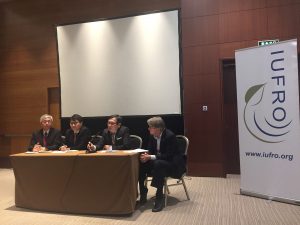
Panelists at the Directors’ Forum
Haruo Sawada, Forestry and Forest Products Research Institute (FFPRI), Japan
Jung-Hwan Park, National Institute of Forest Science (NIFoS), Korea
Gan Kee Seng, Forest Research Institute (FRIM), Malaysia
Jerry Vanclay, School of Environment, Science and Engineering, Southern Cross University, Australia
The IUFRO Directors’ Forum is one of the most important activities within IUFRO and its status of a Special Program reflects this great importance. The forum is a high-level platform for directors of forest research institutions and deans of forest faculties worldwide to debate opportunities and challenges of research management. Read more…
Nature-based solutions to climate change mitigation and adaptation
Session D8-03(42)
Moderator: Xiaoquan Zhang
Tuesday, 25 October 2016, 10:30-12:30 (Room 305)
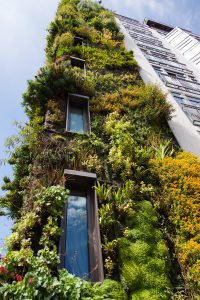
Green hotel. Photo: Vera Kratochvil
During the past 15 years, the rapid expansion of fossil fuels usage has raised global greenhouse gas emissions to the highest levels to date. This has led to a rise in surface temperatures and a significant increase in climate-related risks, including the loss of sea ice in the artic ocean, reduction of mountain glaciers, sea level rise, loss of endangered species, to name but a few.
In urban territories, solar energy and heat are absorbed to a greater extent than in rural areas, thus reducing the evapotranspiration and creating warmer environments. Consequently, the energy demand for cooling is expected to grow strongly with climate change. However, in many cities there is a potential for cooling urban microclimates through adding vegetation and trees and greening roofs and city areas. This will not only help to save energy, it will also be beneficial to the health and quality of life of city dwellers. Read more…
Research and Development for Sustainable Forest in Asia
Keynote Presentation by Don Koo Lee, Seoul National University, Korea, Tuesday 25 Oct 2016
This most inspiring talk about the important roles of trees, soil and forests for human life highlighted ways of how to achieve sustainable development and showcased success stories, especially the historic achievement of reforesting Korea.
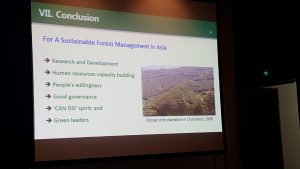
Professor Don Koo Lee speaking about sustainable forest management in Asia. Photo: Gerda Wolfrum, IUFRO Headquarters.
The goods and services provided by forests are manifold and indispensable for people and the environment. Forests are crucial, among other things, for stabilizing soil, providing water resources, supporting biodiversity, protecting against natural hazards, delivering timber and non-timber products, and, quite importantly, combatting climate change. In order to ensure that future generations will be able to enjoy the same benefits from forests, sustainability is indispensable in the management and use of natural resources. Read more…
Invasive Species and Forest Ecosystems under Changing Climate: Ecological, Economical and Social Impacts
Session title: Invasive Species and Forest Ecosystems under Changing Climate: Ecological, Economical and Social Impacts
Moderators:
Daizy R. Batish, Deputy Coordinator IUFRO Division 8.02.04, Panjab University, Chandigarh, India
Shibu Jose, Coordinator IUFRO Division 8.02.04, University of Missouri, USA
Monday, 24 October 2016, 16:00-18:00 (305)
Find more information on the IUFRO Working Party 8.02.04 at: http://www.iufro.org/science/divisions/division-8/80000/80200/80204/
This session took a look at alien species, specifically invasive insects and plants, and their impact on the invaded ecosystems. It particularly addressed the question of how changes within ecosystems associated with climate change affect alien species. Furthermore, presentations shed light on how invasive species can impact the livelihood of people in a social, economic and ecologic level. Read more…
Biomass – Capturing the Potential
Session title: Sustainable biomass for Asia’s growing bioeconomy: regional initiatives and promising examples
Moderator: Viktor J. Bruckman (Austrian Academy of Sciences, Austria; coordinator IUFRO TF “SFBN”)
Monday, 24 October 2016, 16:00-180:00 (302 A)
Find more information on the IUFRO Task Force, Sustainable Forest Biomass Network, at:
http://www.iufro.org/science/task-forces/forest-biomass/
In this session the speakers gave examples of concepts and cases for the sustainable development of biomass in Asia and Oceania. The variety of topics and local conditions highlighted the diversity of research required to provide a sound scientific basis to guide policy that supports innovation and protects forest land from degradation, over-exploitation, and subsequent negative impacts on ecosystem services. Read more…
Traditional Knowledge – A Pathway for Sustainable Forest Management
Moderator: Youn Yeo-Chang
Monday, 24 October 2016, 13:30-15:30 (Room 302B)
Find abstracts on the Congress website http://www.iufro-ao2016.org/en/index.asp?hid= under Congress Program!
In this session, Traditional Forest Knowledge practices were suggested as a collective pathway for sustainable forestry development. However, there are national and international concerns regarding the loss of these traditions and the consequently negative effects for local livelihoods and natural resources protection. China’s economic development, social transformation and governmental intervention have had significant influence in local forest management decisions and culture, moving from the loss of almost all natural forest by 1980, to promoting community-based traditional knowledge building capacity for landscape management by 2010. Read more…
Latest Progresses of Silviculture Research in China
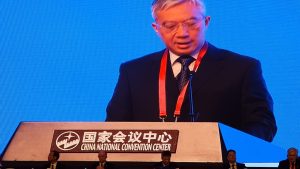
Professor Zhang Shougong, CAF, on screen during the Opening Ceremony
Professor Zhang Shougong, Chinese Academy of Forestry, held the first keynote address at the IUFRO Regional Congress for Asia and Oceania on Monday, 24 October 2016.
As one of the leading scientists in silviculture and forest management in China, Professor Zhang Shougong, President of the Chinese Academy of Forestry, has long experience in establishment of planted forests and sustainable forest management. His research interests cover quality improvement and breeding of larch species, technologies for larch forest management and their application. Read more…
Forest Environment under Changing Climates and Societies
Opening of the first ever IUFRO All Division 8 “Forest Environment” Conference on 23 October, 2016, in connection with the IUFRO Regional Congress for Asia and Oceania in Beijing, China
In his inaugural statement IUFRO Division 8 Coordinator Jean-Michel Carnus highlighted the complete alignment of IUFRO Division 8’s thematic focus with the Regional IUFRO-AO 2016 Congress theme of “Forest Environment under changing climates and societies“.
Recognizing that the participants were the most important ingredients of a successful Congress, IUFRO Vice-President Björn Hånell proudly acknowledged the 20 sessions and 100 presentations of Division 8 that had been fully integrated into the Congress program. He pointed out that the need for knowledge on forest environment had never before been so urgent. And, since such a broad field cannot be mastered alone, scientific cooperation and networking are of utmost importance. Read more…
Systematic Review in Forest Science – Learning from Traditional Forest Knowledge – an Interview
Interview with Maria Veronica Chang, candidate for Master of Environmental Management at Yale School of Forestry and Environmental Studies and participant of IUFRO-SPDC’s Pre-Congress Training Workshop on “Systematic Review in Forest Science – Learning from Traditional Forest Knowledge”.
Please introduce yourself briefly.
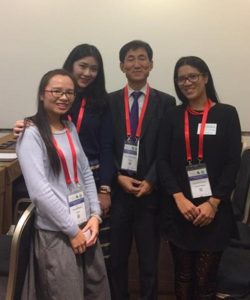
Participants of Pre-Congress Trainings Course. Photo: provided by Veronica Chang (right)
My name is Maria Veronica Chang, candidate for Master of Environmental Management at Yale School of Forestry and Environmental Studies. I have a keen interest in community based tropical forest restoration, particularly in the Neotropics. I am a native of Guayaquil, Ecuador, and I hold a B.S. in Agricultural Economics. Prior to my arrival at Yale, I worked as an environmental educator at Cerro Blanco Tropical Dry Forest in Guayaquil, and as a manager of a sustainable farm in the coast of Manabi, Ecuador. At Yale F&ES, I’m focusing my studies and specialization in tropical forests restoration and management. Additionally, I’m contributing to Yale ISTF (International Society of Tropical Foresters) as treasurer, and as a research assistant for the Map of Life Project. For my master’s project, I conducted my research and work in Azuero, Panama, measuring Agroforestry and Conventional restored plantations in degraded cattle-ranching landscapes. My research will assess the potential of forest restoration programs to incentivize landowners into adopting carbon sequestration systems and improving landscape management practices.
How did you learn about this workshop?
I learned about the workshop through the IUFRO webpage while I was registering for the congress.
Is this the first time for you that you take part in an IUFRO event?
Yes.
Why did you want to participate in this workshop?
My previous research will support local farmers providing data that will help them to adopt sustainable management decisions. However, as a researcher, I think it is important not only to investigate urgent environmental problems and potential solutions. It is also essential to learn the tools to effectively inform scientific findings that would influence the policy decision-making process and therefore, secure the wellbeing of the communities in the long-term.
What do you hope to gain from this workshop?
I hope to gain skills and expertise in conducting future systematic review work concerning relevant forestry and environmental issues. I think there is a great opportunity to get involved and help to establish evidence-based framework that could be used for policy and future environmental agreements.
Would you recommend this workshop to your colleagues?
Definitely, yes!
Thank you for this interview!
Additional information: http://www.iufro.org/science/special/spdc/actproj/twsbeijing16/
Blog post: https://blog.iufro.org/2016/10/23/systematic-review-in-forest-science-learning-from-traditional-forest-knowledge/
Photo:
from left to right:
Minghui Zhang (Seoul National University), Yinghe Huang (Renmin University of China), Prof. Youn Yeo-Chang (Seoul National University), and Veronica Chang (Yale University) during the TFK Session at IUFRO AO 2016 Congress, Beijing
